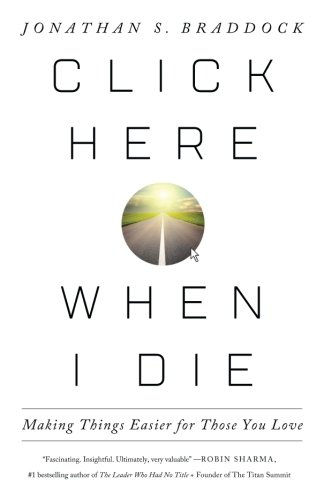Ellen’s story

Ellen was making arrangements with her neighbor Jean to take care of some household things as she and her husband Ed were going to be away for a few days. You see, Ed was having surgery the next day and Ellen anticipated being tied up at the hospital over the course of the next several days while he recuperated.
While Ellen and Jean were talking, Jean described a book she had just finished reading. It was a book about preparing for death and the unexpected. Not that Jean wanted to suggest any negative outcomes to her friend and neighbor, but the book was funny and provided a lot of important information, so she gave it to Ellen and suggested she brouse through it.
While she hated to even think about a bad outcome or something going wrong during surgery, the anticipation of the event caused her to consider all outcomes – even the bad ones. If something went wrong, Ellen couldn’t bear to think about the devastating emotional loss, but then something else hit her; she knew nothing of their finances and wouldn’t even know where to start looking for things if something happened to Ed.
After her visit with Jean, Ellen came home to find Ed preparing for his upcoming surgery. He was doing all the things most of us would think about the night before a surgery. (Making sure the bills were paid current, making sure his desk was in order, he scratched out brief instructions on how to use the TV remote and other things he was normally in charge of.) Seeing this, Ellen told him about the book she had received from Jean and suggested he peruse it – at least it might help him sleep.
As it turned out, Ed didn’t sleep much at all. The anticipation of the mornings surgery was weighing heavy on his mind. Somewhere in the late evening hours, he decided to pick up the book “Click Here When I Die” by Jonathan S. Braddock and began reading. It was seven hours later that Ed finished the book. The book itself is a relatively short read (about 2 ½ hours total), but there was so much information that Ed hadn’t thought of that Jean would need to know if the surgery didn’t go well. He read, and jotted notes, he read more and jotted more notes. He couldn’t believe all the things he took care of that she would have never known about. He jotted down the location and access of their most critical documents and accounts. He noted the location of financial accounts and insurance policies. He even noted their monthly bills, when they were due, how they were paid, if they were automatically drafted or if payments needed to be generated. He left instructions for her on how to access his cell phone and computer, as there was a lot of information stored there. There was so much for her to know, and unfortunately, trying to jot this all down the evening before surgery wasn’t the best time to do it. But by the morning he felt like he recorded the important things.
Ed’s surgery went as expected and he returned home a few days later. Ellen shared their story with us in hopes that their experience will motivate others to read this book and get educated on what it means to prepare for your own passing. “People don’t realize the extent of information they keep to themselves that loved ones will need when they are no longer here.”